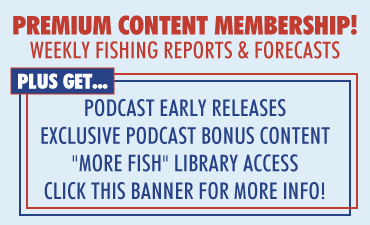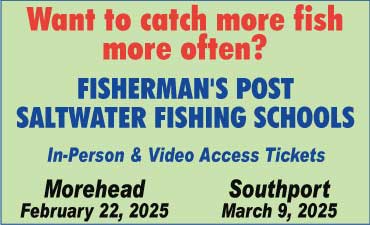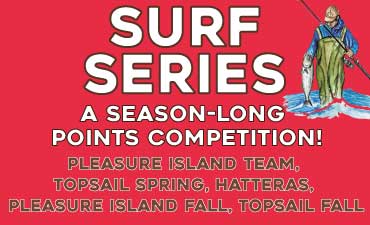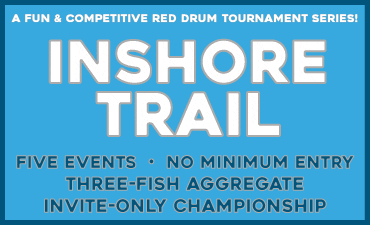Releases May 13, 2010
There are changes in the 2010 Swansboro Rotary Tournament, a thirty-year tradition held each year on Memorial Day weekend.
The tournament committee has decided to split the tournament into a blue water tournament in May on Memorial Day weekend, and a separate king mackerel tournament will be held in October. The king mackerel tournament will be held in conjunction with an inshore tournament and kids fun tournament.
In the past, the blue water and king mackerel competition was held simultaneously.
The Swansboro Rotary Club has always considered their blue water tournament a tune up for the Big Rock. The Rotary event has produced large catch and release numbers, and they have weighed some of the largest blue marlin of the season for the last two years running.
The Big Rock Landing will be the primary weigh-in station. The blue water tournament will also have a meat fish weigh station in Swansboro.
This is the thirtieth year, so they will be giving an additional $1000.00 to the thirtieth fish weighed during the tournament.
The elusive yellowfin tuna has built a Level One and TWT potential winnings of $13,740 (plus this year’s pot), so get into the TWT to be eligible for the full amount.
You can register on their website at www.kingbluewater.com.
On April 18, ASA staff and supporters of the Cape Hatteras recreational fishing community met with Jon Jarvis, Director of the National Park Service, to discuss concerns with access restrictions to the Cape Hatteras National Seashore Recreational Area (CHNSRA).
The U.S. Environmental Protection Agency recently published in the Federal Register the Draft Environmental Impact Statement (DEIS) for the CHNSRA Off-Road Vehicle Management Plan. The DEIS evaluates the impacts of several alternatives for regulations and procedures that would manage the park’s wildlife and provide reasonable access to the CHNSRA.
To view the DEIS and for information on how to submit comments, please go to www.preservebeachaccess.org/landingnew/deis.html.
For more information in general on the topic, visit www.keepamericafishing.org.
A four-month spawning season closure for shallow water grouper in the South Atlantic ended at 12:01 a.m. local time on May 1, 2010. The prohibition on recreational and commercial harvest of gag, black grouper, red grouper, scamp, rock hind, red hind, coney, graysby, yellowfin grouper, yellowmouth grouper, and tiger grouper is effective January 1 through April 30, each year. The commercial fishery for red porgy also opened May 1, 2010.
There are other openings soon, and the following fisheries will open at 12:01 a.m. local time on the respective opening dates.
The vermilion snapper commercial fishery will open July 1, 2010. The recreational fishery for vermilion snapper opened on April 1, 2010. The commercial fishery for black sea bass opens June 1, 2010.
If you would like to receive fishery bulletins via e-mail as soon as they are published, please email us at sero.communications.comments@noaa.gov.
Take your angling to new levels after a May 22 seminar on kite fishing at the North Carolina Aquarium at Pine Knoll Shores.
Local charter captain and tournament angler Chesson O’Briant shares tips on this special technique to extend your reach.
“Fishing with a kite allows you to deploy baits farther from the boat, while keeping the leader and other terminal tackle out of the water. These facts substantially increase your chances of catching spooky fish, in addition to promoting exciting surface strikes,” he said.
O’Briant will discuss anchor and drifting kite tactics with live bait for his favorite fishing pursuit, king mackerel. He also will cover high-speed offshore tactics for mahi and tuna, using artificial flying-fish lures.
O’Briant has been fishing the local area for 18 years, taking a break to earn a biology degree with a concentration in marine science from Duke University. He runs CXC Fishing Charters out of Emerald Isle and captains the Emerald Marine fishing team.
The seminar is from 1:30 p.m. to 3:30 p.m. in Soundside Hall and is free with admission or membership. Registration is not required. For more information, contact Aquarium Education Director Todd Spangler at (252) 247-4003, ext. 288.
The North Carolina Aquarium at Pine Knoll Shores is five miles west of Atlantic Beach at 1 Roosevelt Blvd., Pine Knoll Shores, NC 28512. Hours are 9:00 a.m. to 5:00 p.m. daily.
The N.C. Wildlife Resources Commission has launched a new, easier way to find more than 200 free public Boating Access Areas across the state.
The Interactive Boating Access Area Locator lets boaters search for a ramp by address, body of water, or amenities. Once they locate a Boating Access Area, users can zoom in and out of the map, find an address, identify latitude and longitude coordinates, and print directions.
“Providing access to public waters and providing informative, easy-to-use tools to locate that access go hand in hand,” said Erik Christofferson, Chief of the Division of Engineering Services. “This interactive map, along with our more than 200 Boating Access Areas, is another way we are helping boaters across the state get in the water.”
To access the map, visit the Boating and Waterways page on www.ncwildlife.org and click on Interactive Boating Access Area Locator.
The South Atlantic Regional Research Project (SARRP) today released a plan identifying critical research needed to protect the health of coastal ecosystems and the economies that depend upon them in the southeastern United States. Funded by the NOAA National Sea Grant College Program, SARRP’s regional scope extends from Currituck Bay, near North Carolina’s border with Virginia, to the southern tip of Florida.
The report acknowledges that the southeastern coastal waters are healthier than most other coastal regions along the mainland U.S., but human population growth, increased urbanization, conflicting uses of coastal and ocean resources, offshore energy and resource development, and the hazards associated with hurricanes and climate change pose threats to the environmental and economic health of the region.
SARRP was managed by the Sea Grant programs in Florida, Georgia, South Carolina and North Carolina, and coordinated by the Georgia Coastal Research Council. The plan is intended for use by all the agencies and stakeholders in the region. In addition to prioritizing research issues, the project report encourages increased regional research and cooperation among state and federal agencies along with colleges and universities.
The research priorities categories mirror the four priority issue areas identified by the South Atlantic Alliance (www.southatlanticalliance.org). Organized by the governors of North Carolina, South Carolina, Georgia, and Florida, the Alliance is a regional ocean partnership to develop and apply regional approaches to coastal and ocean issues of regional significance in the southeastern United States.
“North Carolina’s critical coastal and ocean issues resonate throughout this regional plan,” said Michael P. Voiland, executive director of North Carolina Sea Grant. “We are pleased to have been a partner in shaping the plan—and we will continue to work across the region and in North Carolina to identify and help support research projects that meet the recommendations.”
Among its 27 recommendations, the SARRP report describes the need for studies that assess impacts that projected changes in sea level and temperature could have on fisheries and other marine species, and for research to determine the amount of freshwater flow required to ensure the health of estuaries and fisheries. The effects of population growth on sensitive coastal habitats also should be studied.
The report also recommends that researchers examine the impacts of offshore energy development in light of renewed interest and the lifting of the moratorium on energy exploration along the Atlantic seaboard.
Read more about the project and access the full research plan at www.gcrc.uga.edu/SARRP/Documents/SARRP_ResearchPlan_2010.pdf.
For more information about the National Sea Grant College Program, visit www.seagrant.noaa.gov.
The Southern Flounder Fishery Management Plan Advisory Committee to the N.C. Marine Fisheries Commission will meet at 6:00 p.m., May 20, at the Craven County Agricultural Extension Building, 300 Industrial Drive, New Bern.
For more information, contact division biologist Chris Batsavage at (252) 808-8088 or Chris.Batsavage@ncdenr.gov.
You may also contact the Marine Fisheries Commission office at (252) 808-8023.
Wildlife officers with the N.C. Wildlife Resources Commission are reminding boaters that a new state law went into effect on Saturday, May 1.
General Statute 75A-16.2, known as the Boating Safety Education Law, requires anyone younger than 26 operating a vessel powered by a 10 horsepower or greater motor to have successfully completed an approved boating safety education course or otherwise be in compliance.
The law was passed by the General Assembly to improve safety on North Carolina waters. Required instruction covers navigation, proper vessel operation, and safety and legal requirements.
For more information or to enroll in a free course offered by the N.C. Wildlife Resources Commission, go to www.ncwildlife.org or call (919) 707-0030.





